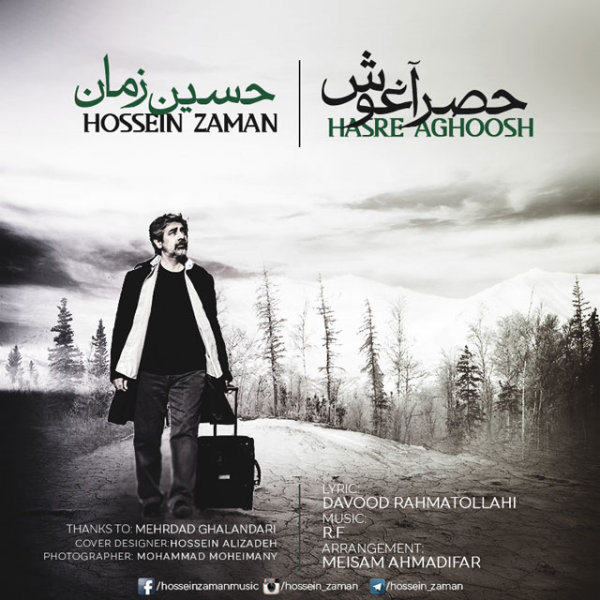He rose to fame as a pop star in the mid-1990s, but now the songs he’s known for are banned from Iranian radio and television. And for the last 14 years, he has also faced a ban on performing.
Hossein Zaman is a veteran of Iranian censorship, and has been excluded from the country’s official music scene because of his politics. “Since the revolution, religious hardliners have put restrictions on music,” he told IranWire, “but recently, political animosities have been added to the mix.”
Zaman says it’s his duty to sing and make music, but there is much more to it than that. “The regime is opposed to my political and social beliefs,” he said, “I have always believed that an artist must enlighten others, must understand people’s pain and tell them about social problems. If I saw a social ill I did not stay silent. I talked about it explicitly in my interviews with the press and expressed my criticisms — but the gentlemen cannot handle criticism.”
To begin with, Zaman’s music was banned from Iran’s state-run radio and TV. “I started my artistic work in 1996, but I worked for only five years. Since 2001 my work has been banned from the Islamic Republic of Iran Broadcasting (IRIB). Mr. Larijani [Ali Larijani, current speaker of the parliament who the was head of IRIB from 1994 to 2004] ordered all the networks not to broadcast any of my work. The ban continues today.”
The censorship of Zaman’s work was punishment for his support for reformist President Mohammad Khatami. “My support for reforms was one of the reasons against me,” he says. “I participated in Mr. Khatami’s rallies and campaigned for him.”
Though he was banned from radio and TV, for a time he was still permitted to perform in concerts and release albums — but soon this right was taken away from him as well, and he has now not been able to perform for 14 years. “When I went to the Ministry of Culture, they told me that they could not permit me to go on stage. Then they added making albums and I was banned from both.”

Orders From “Above”
Zaman tried to find out the reason for the ban. He was given one answer, and it has not changed throughout the years. “We have orders from above not to give you permit,” the Ministry of Culture has repeatedly told him for the past 14 years. “They never answered my question about who the ‘above’ was — at least then, I could go to him and demand my due.”
In a press conference in 2015, Hossein Noushabadi, a spokesman for the ministry, said that Iran did not ban singers. Hossein Zaman wrote a letter to then-Minister of Culture Ali Jannati, explaining his own situation. “Mr. Minister, this is a lie!” he wrote. “Your colleagues have told me that I am not permitted to work. It would be better if the Ministry of Culture would show some respect for the people and, instead of lying and using sophistry, announce this officially. This way people will trust you. Right now you have no power of your own and get your orders from somewhere else.”
Zaman says that restrictions on him started towards the end of Khatami’s presidency and continued under Mahmoud Ahmadinejad’s, and now under President Hassan Rouhani. He has appealed to the Ministry of Culture and Islamic Guidance a dozen times but has never received a satisfactory answer for why the ban on him remains.

“Remove Your Music Or We’ll Remove You”
Over the last few years, Zaman has recorded singles, which he has released on his own website. But this has not gone unnoticed. “I didn’t want to allow them to silence me,” he said. “Early on, when I started to post my music online, I got a call from the authorities. They did not identify themselves but just asked why I was doing what I was doing. I told them I didn’t need a permit for posting songs on the web since they were not available in Iran. They were very angry and told me to remove the songs as soon as possible. I refused. Then they said, ‘If you don’t remove them, we will remove you.’ Nothing happened, but nonetheless, it was very hard on me. It is very difficult to release my songs online without being able to promote them or perform them on stage.
Zaman says musicians make the majority of their income from concerts. “The sale of albums in Iran is low, so sales perhaps covers one-tenth of the costs. Musicians get their income from performing live. Over these last years, I had to pay out of my own pocket to make money, or borrow from friends and accept their help to record a few songs and publish them online — because I did not want to be silenced.”
Some of his music is political. For example, the song “Prisoner” is about people jailed after the disputed 2009 presidential election. Zaman supported reformist candidate Mir Hossein Mousavi and as a result, the pressure on him increased. “There were restrictions before, but pressures mounted in 2009,” he said. “I have been living on Kish island for the last 15 years because in Tehran they harassed both me and my family. When I moved to Kish we were left alone for some years, but in 2009, authorities twice took steps to evict me from the island. Kish Free Zone’s Security summoned me and explicitly told me that they did not want me there. On June 15, 2009 my wife and I were in our car and authorities pulled us over and arrested us. I was detained for 24 hours. They took me to court and put me on trial at night. When I asked why, they told me: “You are the only undesirable element on the island. We are suspicious of you and we brought you here to make sure that you are not creating unrest and insurrection.’”
Zaman is a communication and electronics engineer and has taught at universities for many years. He was a member of the Scientific Board of Sharif University at Kish, but now he has also been banned from teaching. “Since 1986 I was a contract teacher at institutions of higher education,” he said. “I taught at many places. The last one was the Sharif University at Kish and for 10 years I sat on its scientific board, but toward the end of Mr. Ahmadinejad’s presidency, the management changed and they terminated my contract. Since then, and after 28 years of teaching I can no longer teach.”
Today, Zaman works as a consultant for an internet company on Kish Island and is studying for a Ph.D. “I have registered at a university outside Iran to study information technology,” he told IranWire. “Since my expertise is electronics and communication, I work as a consultant for a company in the same field. But I really no longer have a job. I had two sources of income: Teaching at the university and my artistic activities. Now they have cut off both.”
visit the accountability section
In this section of Iran Wire, you can contact the officials and launch your campaign for various problems


























comments